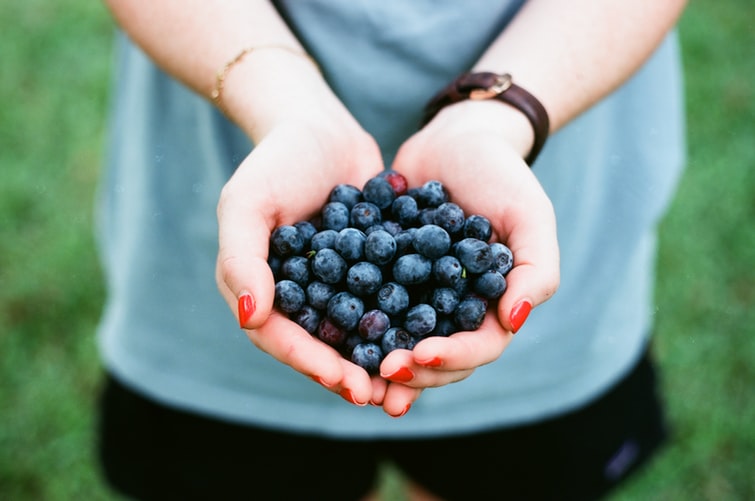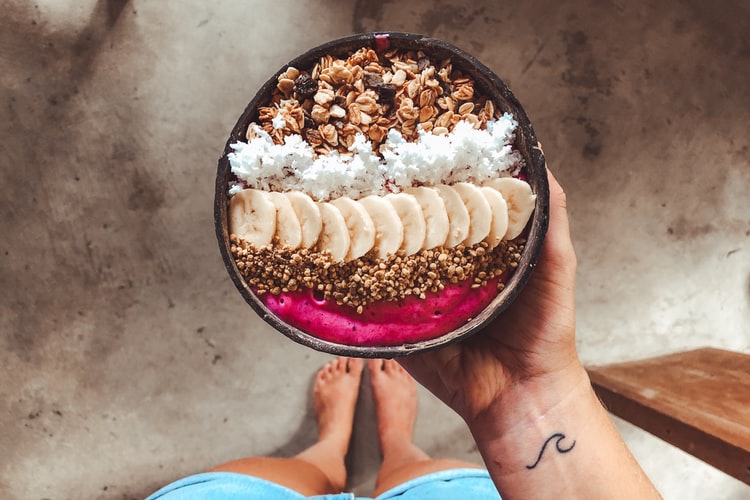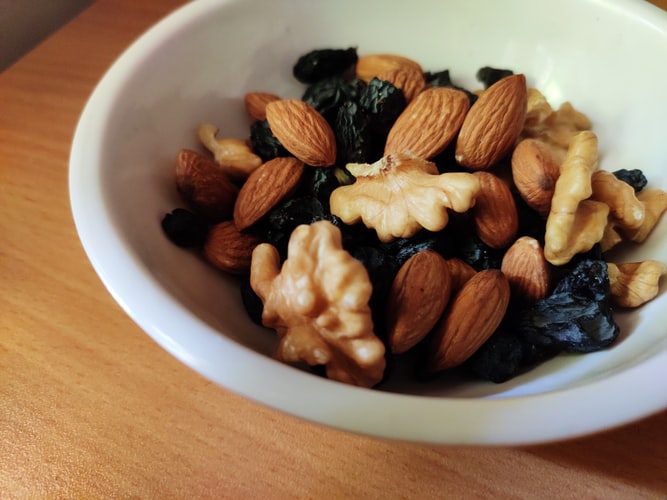In this post we discuss ways to eat healthily and stay in good shape. You may know that a healthy diet is essential to stay healthy and fit. However, it may still seem quite challenging to figure out what exactly you should eat and how much. After all, what is “a healthy diet?”
Don’t worry – we’ve got all the answers you need. In this article, you’ll find out how diet impacts your health, which foods are good for maintaining a healthy and fit body, which are bad, what to do if you want to lose or gain weight, and why a Sedentary Lifestyle is not good.

Image Source Unsplash.com
How to Eat Healthily and Stay in Good Shape
Read on, start looking out for what you eat, and stay in good shape.
What Is a Healthy Diet?
A healthy diet is one that meets your nutritional needs by supplying the nutrients you need while keeping your calorie intake at a reasonable level.
In other words, it should provide you with all the vitamins and minerals you need in order to stay in good health, while also preventing too much weight gain.
You can get the nutrients you need by eating a variety of different foods, including fruits, vegetables, whole grains, dairy products, fish, and lean meat.
A healthy diet should include some fat, but also be low in saturated fats and trans fats. The foods you eat should also be low in added sugars, salt, and refined grains. An overall healthy diet is rich in fiber and includes plenty of water.
Sometimes, the diet is not enough, and it needs to use some help from diet supplements – and that’s normal. A healthy diet can include diet supplements.
If you’re in need of some, you can check out, for example, Healthspan, and while you’re at it, here are some discounts for healthspan.
How Your Diet Impacts Your Health
There are numerous ways diet impacts your health. In fact, it’s the way we get most of the nutrients we need, which are essential for performing many of the body’s chemical reactions. However, not only do our bodies rely on nutrients for proper functioning, but some of them (such as calcium) can also help prevent conditions such as osteoporosis.
How does diet impact your health? Let’s take a look at the following examples:
Your skin health depends on the nutrients you consume. For example, having enough zinc in your diet is crucial if you want to have healthy skin and strong hair and nails. The same goes for vitamin A – an antioxidant that protects your skin from aging and helps fight acne and psoriasis.
Your immune system functions on a daily basis to defend your body against harmful bacteria and viruses. To perform properly, it needs vitamins C and E, among others (such as vitamin A). In addition, an adequate intake of omega-3 fatty acids is essential if you want to fight infections effectively.
If you suffer from high cholesterol levels or high blood pressure (hypertension), your risk of heart disease will increase significantly if you don’t change your diet. It’s all about eating less saturated fats and trans fats and more omega-3 fatty acids and fiber.
Eating a balanced diet rich in nutrients can boost your energy levels and give you a clear mind. If you want to stay alert throughout the day, your meals should be balanced and include proteins, fibers, carbohydrates, vitamins, minerals, and healthy fats.
Your digestive system relies on your gut flora to break down food and absorb nutrients into the bloodstream. Gut flora is a complex system that’s impacted by what you eat – for example, too much-processed food can lead to a number of digestive disorders.
Foods That Are Good for You
Eating healthy doesn’t have to be difficult – there are plenty of foods out there that can help you achieve great results without putting an extra strain on your budget. Here are some examples:

Image Source Unsplash.com
- Fruits – Fruits are rich in water and fiber and also contain large amounts of vitamins A, C, and K. They’re a great source of minerals as well – apples contain potassium and magnesium; bananas contain potassium; oranges contain calcium; lemons contain phosphorus, and pineapples contain manganese. You can also enjoy smoothies made with fruit or juice. In addition, fruits are a great alternative to desserts – try making a fruit salad, a sorbet, or adding berries to your yogurt bowl.
- Veggies – Vegetables are low in calories but have a high nutrient value and are rich in vitamins and minerals. They’re also an excellent source of fiber – corn contains 115% of the recommended daily intake; potatoes contain 110%; carrots contain 84%; tomatoes contain 95%; broccoli contains 93%; cauliflower contains 87%, and onions contain 86%. If you don’t like cooked veggies, try juicing them instead – this way you get all the nutrients without having to cook anything.
- Grains – Whole grains are one of the most important sources of fiber found in nature. They’re packed with B-vitamins such as thiamin (vitamin B1), niacin (vitamin B3), riboflavin (vitamin B2), pantothenic acid (vitamin B5), and folate (vitamin B9). Whole grains are also high in magnesium and potassium – brown rice contains 66% of the recommended daily intake; quinoa contains 468%; oats contain 226%; whole wheat bread contains 127%; barley contains 115%; rye contains 83%; millet contains 68%; buckwheat contains 63%; amaranth contains 62%; polenta contains 55%; cornmeal contains 53%; bulgur contains 48%; sorghum contains 45%; and spelt contains 40%.
- Dairy products – Dairy products are an excellent source of protein, calcium, riboflavin (vitamin B2), phosphorus, vitamin D, vitamin A, vitamin E, vitamin B12, zinc, iodine, selenium, riboflavin (vitamin B2), iron, copper, manganese, vitamin B6, folate (vitamin B9), pantothenic acid (vitamin B5), niacin (vitamin B3), choline (an essential nutrient), and vitamin K1. Cheese is a good source of calcium – grated mozzarella contains 115% of the recommended daily intake; cheddar cheese contains 100%; Swiss cheese contains 96%; Parmesan cheese contains 95%; dry curd cottage cheese contains 90%; ricotta cheese contains 89%; goat cheese contains 88%; feta cheese contains 87%. Yogurt is rich in calcium – Greek yogurt contains 120% of the recommended daily intake; regular yogurt contains 96%. Buttermilk is a good source of calcium and zinc – buttermilk contains 116% of the recommended daily intake; soured milk contains 107%.
- Eggs – Eggs are rich in vitamins, minerals, protein, and healthy fats. They’re a versatile food with numerous health benefits – eggs contain vitamins A, B6, B12, and E as well as minerals such as selenium, copper, iodine, iron, magnesium, zinc, phosphorus, potassium, and manganese.
Foods You Should Avoid
There are also some foods that you may want to avoid if you want to stay healthy. In addition to being high in sugar and sodium (which can lead to a number of health conditions), they’re also high in saturated fats and trans fats. Here are some examples:

Image source Unsplash.com
- Processed meat – Processed meat is an excellent source of calories, but it often contains too many calories for what it has to offer. It’s also high in saturated fat and salt.
- Sugar-sweetened beverages – These include soda, sweet tea, sports drinks, and sweetened juice. They’re high in calories and sugar (which can lead to obesity and diabetes) and also contain artificial sweeteners (which have been linked to cancer).
- Energy drinks – These contain large amounts of caffeine, which can cause nausea, vomiting, anxiety, seizures, heart problems, strokes, and even death. Caffeine can also interfere with sleep and cause insomnia.
- Candy – While candy might taste great and provide you with a quick burst of energy, it’s very high in sugar and calories.
- Salty snacks – This includes chips, pretzels, crackers, fried snacks, salted nuts (such as peanuts), salty crackers (such as Goldfish), and potato or tortilla chips. They’re usually very high in sodium (which can lead to high blood pressure) and processed fats.
- Fried chicken – Fried chicken is a great source of fat and carbs, but it’s also high in calories.
Foods That Help You Lose or Gain Weight
If you want to lose or gain weight, you need to make sure you’re eating the right kinds of foods. For example, if you need to lose weight or do physical activity regularly (such as running), your diet should include lean protein sources such as fish and chicken breast.
Eat complex carbohydrates instead of simple ones (such as bread), eat fiber-rich foods (such as vegetables), and eat more fruits than vegetables. Drink plenty of water throughout the day. In addition, make sure you’re getting enough healthy fats.
If you need to gain weight, your diet should include plenty of whole grains and dairy products as well as lean meats. You should also eat foods rich in healthy fats (such as nuts) and drink plenty of water throughout the day. You can also try the lazy keto meals described in this article.

Image Source Unsplash.com
The Bottom Line
How many times have you heard ‘healthy diet is essential’ or ‘you need to have a healthy diet to stay fit‘? Probably plenty. And how many times has someone actually explained what a healthy diet means? It’s very possible that none.
Well, after reading this article, you shouldn’t have a problem with understanding what it is, and what foods should be included in it, or which ones should be avoided.
Remember that if you ever have any doubts in regards to what your diet should include, or maybe you have some allergies, and you’re not really sure how to substitute foods you are allergic to, you can always contact a local dietician. This way you can be sure that changing your diet will help you, and not bring you harm. Good luck!